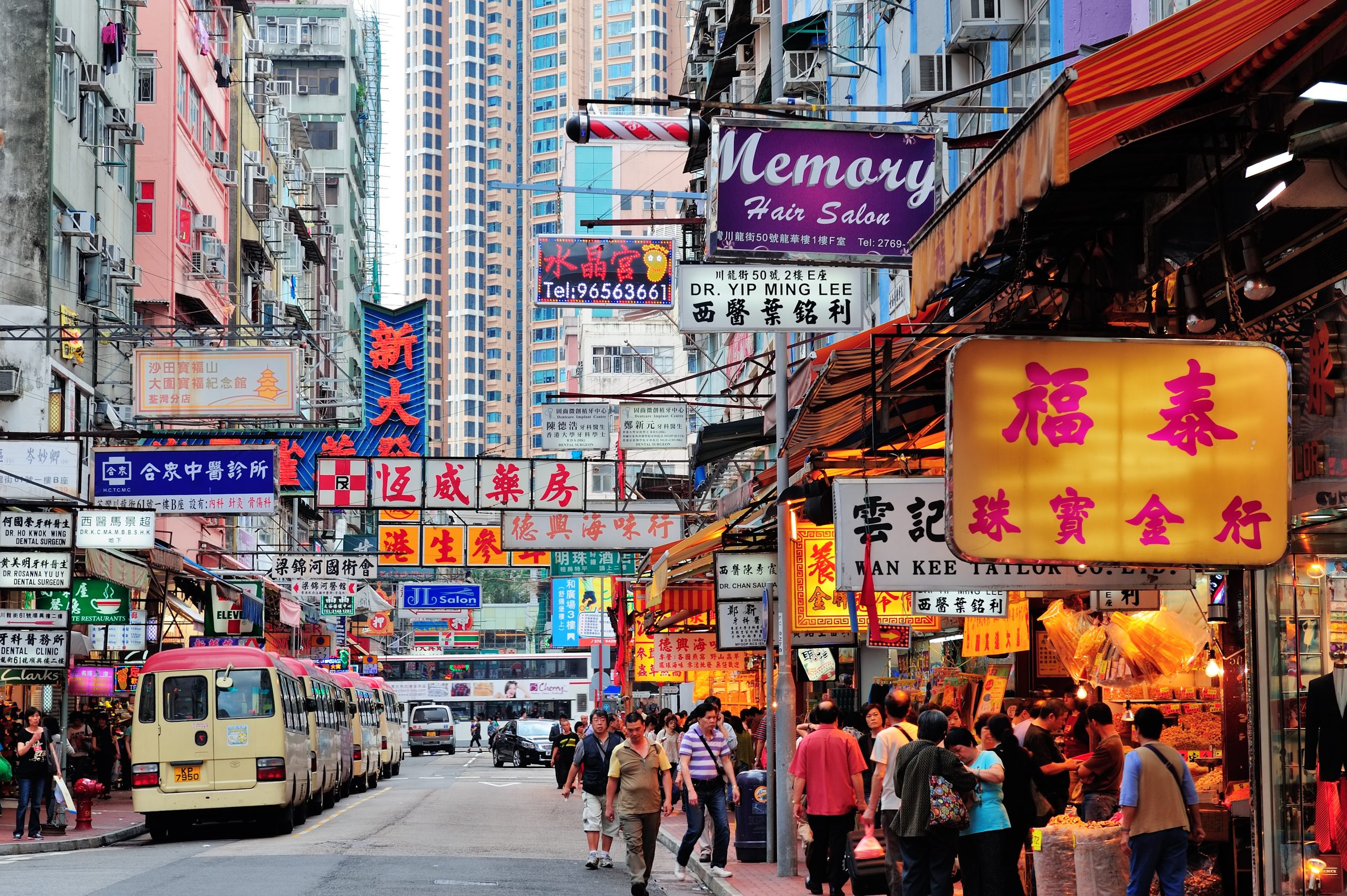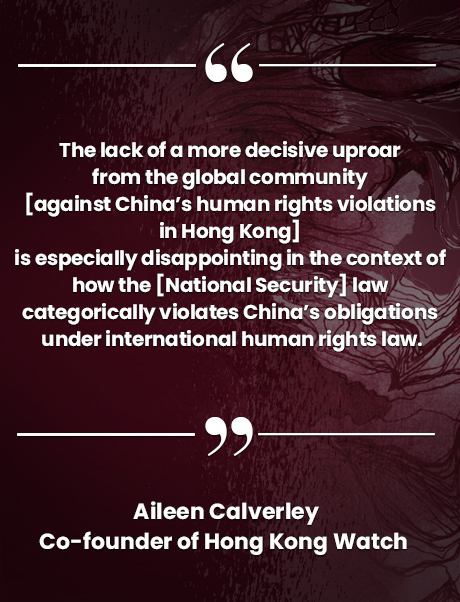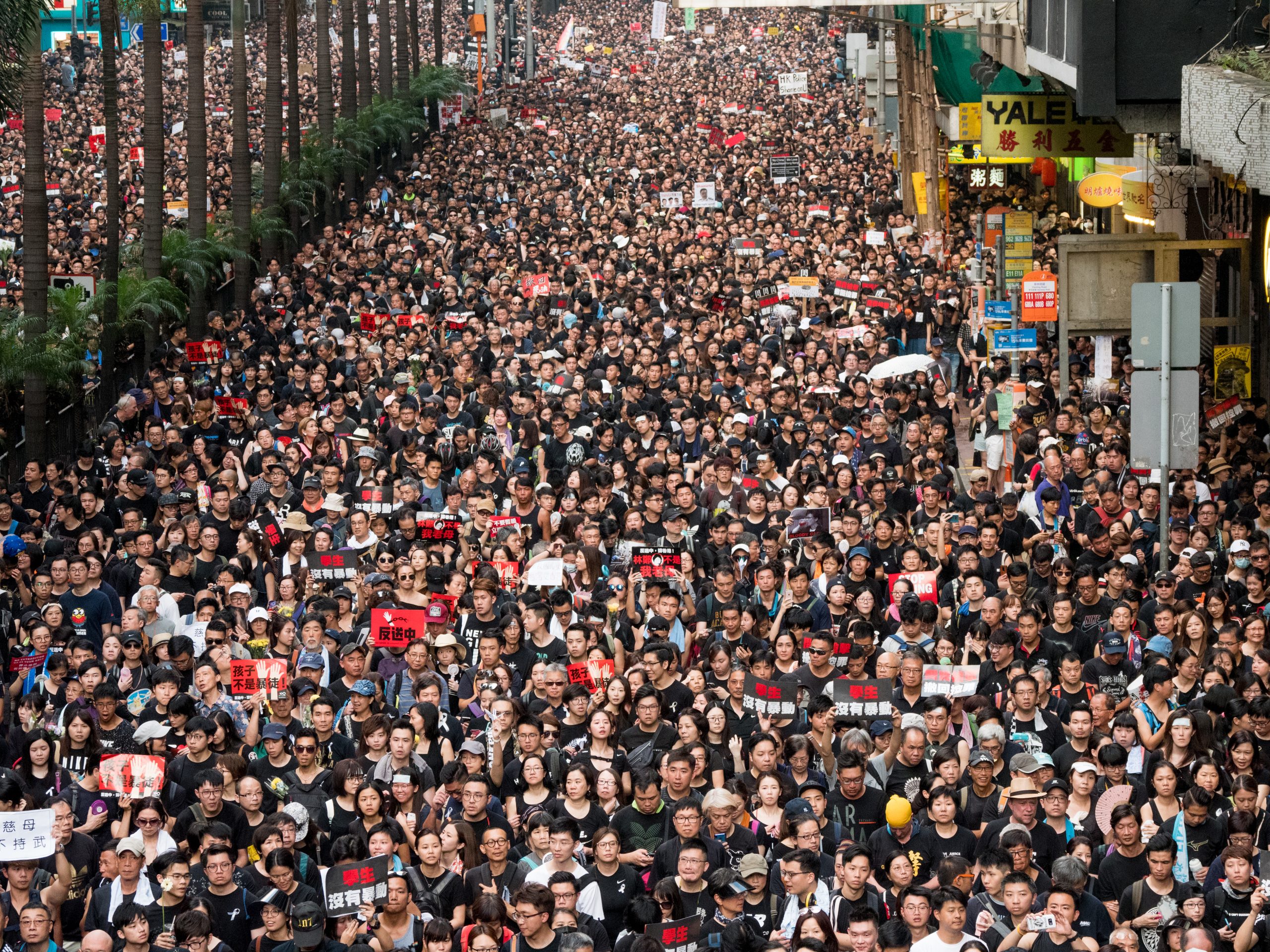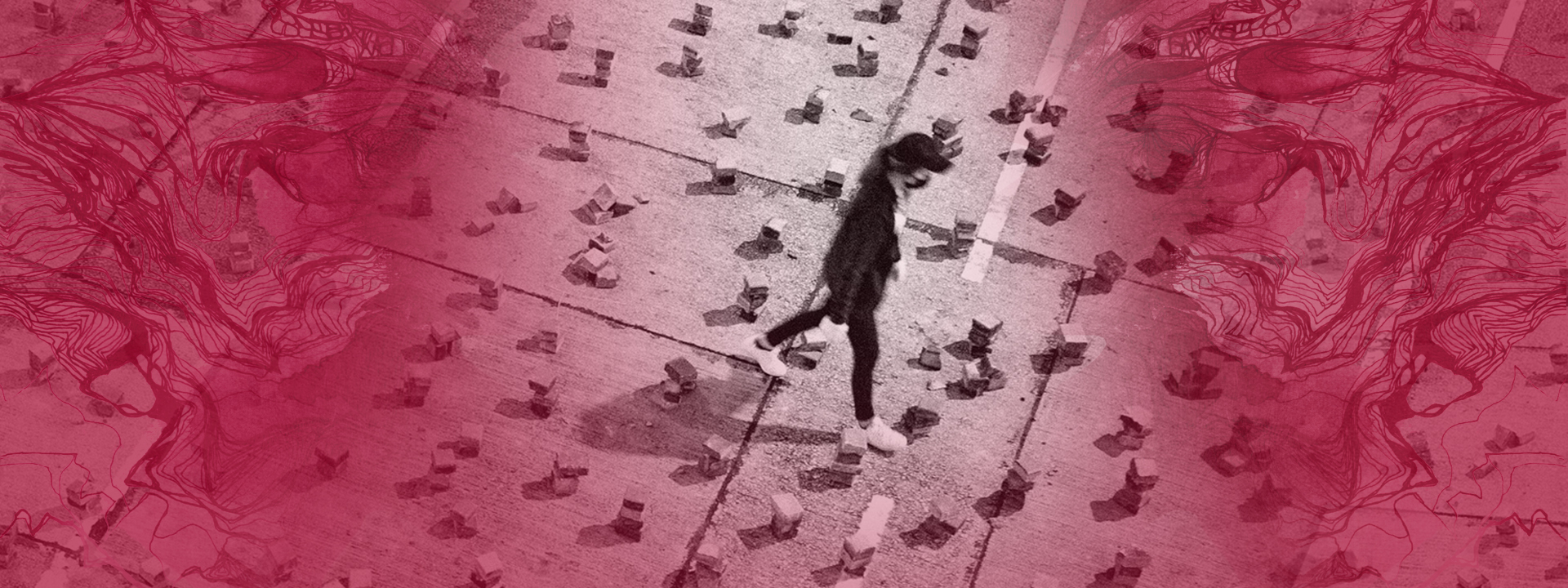The beginning of April 2021 saw the latest blow to Hong Kong’s beleaguered pro-democracy movement when seven of its prominent members were convicted of unlawful assembly in relation to a 2019 rally that a court ruled was illegal.
Among them were politician and lawyer Martin Lee and media tycoon and Apple Daily founder Jimmy Lai, both of whom now face possible jail time.
The development comes in the heels of another setback, described as a decisive overhaul of Hong Kong’s electoral system that came into effect in late March, which granted Beijing the power to vet candidates for its legislative council and election committee. This all but guarantees that state bodies in Hong Kong will now be packed with pro-Beijing voices.
The once-vigorous movement, led by a youth sector radicalized during the 2014 Umbrella Movement, mobilized huge protest actions that rocked the financial hub for months in 2019, until the rallies dwindled due to a combination of COVID-related restrictions, unceasing police brutality, and the implementation of the much-feared National Security Law in June last year.
More than 23 years after the handover of the former British colony, Hong Kong appears to be on the brink of surrendering the last of its democratic spaces to authoritarian control, and the international community has not done nearly enough, said Joey Siu, associate for UK-based monitor Hong Kong Watch.
“We failed Hong Kong, and it is our responsibility to take prompt actions now, to stop the situation in Hong Kong from continuing to worsen, to stop the Chinese Communist Party from continuously extending its long arms overseas,” she added.

Almost 25 years since the historic handover, Hong Kong is buckling under the crushing weight of China’s crackdown on the last vestiges of democracy in the city.
Silence from the global community?
At a side event to the 46th regular session of the United Nations Human Rights Council (UN HCR) in March, advocates including Siu called for a stronger stance from the international community in not only condemning the deterioration of the human rights situation in Hong Kong but in taking more decisive steps that will pressure Beijing to relent.
“We have not been doing enough to really hold China accountable for its human rights violations,” Siu said. “It is time for us to live up to our historical obligations, and also to stand up against the Chinese Communist Party for its human rights violations.”
It’s a scenario that many had anticipated—and feared—when Hong Kong returned to Chinese rule in 1997, which Beijing sought to appease with key legal commitments. These include the so-called Hong Kong Basic Law, put in place to ensure autonomy for Hong Kong for 50 years after the transition and continuing protection for its citizens.
The fears appear to be well-founded. The proposed amendment to an extradition law in 2019, which would have allowed extraditions to mainland China and which sparked the biggest pro-democracy protests in Hong Kong in three decades, was seen as one such infringement of the Basic Law.
“When the agreement was made, that the UK would pull out of Hong Kong, the agreement with China was very, very clear,” said Baroness Helena Ann Kennedy, director of the International Bar Association’s Human Rights Institute. “The separate systems would remain separate. And that there would be a recognition of the culture and traditions and the legal and democratic system of Hong Kong going forward.”
But what really tightened the noose on dissent in Hong Kong, and which dealt the pro-democracy movement a debilitating blow, was the National Security Law, a sweeping legislation that paved the way for a brazen crackdown on activists and government critics. Over months, more than 10,000 were arrested and 2,300 others charged, according to Hong Kong Watch.
Shortly after it took effect, the law became the subject of competing responses from the international community during the 44th session of the UNHCR, but many democracies, especially in Asia, sadly opted to remain neutral, said Soo Yon Suh, program manager for Asia Democracy Network.
“It says a lot about the state of Asia and how important for us to really lobby and talk to the democracy champions in Asia, to the governments in Asia to really support and speak out on Hong Kong for human rights and democracy in Asia overall,” she said.
Led by Cuba, 53 countries expressed support for the law, including Bahrain, Cambodia, Pakistan, Saudi Arabia, and United Arab Emirates and many others in Asia. Japan was the lone Asian country among those that opposed, in a list dominated by Western nations. Notably absent in either camp are major Southeast Asian democracies as well as India.

July 2020. Hong Kong police raise a purple flag warning protesters against acts that violate the controversial National Security law.
Clear violations of international law
The lack of a more decisive uproar from the global community is especially disappointing in the context of how the law categorically violates China’s obligations under international human rights law, said Aileen Calverley, co-founder of Hong Kong Watch.
This played out in January this year during the mass arrest of 53 pro-democracy activists, politicians, and other organizers and participants in the primaries for the legislative council elections, the largest crackdown unleashed by the Hong Kong government under the National Security Law.
Among those arrested, 47 had been charged with conspiracy to commit subversion and face the possibility of life imprisonment. Of these, 32 had been denied bail. The other 15 were initially granted bail, only to be sent back to jail after prosecutors objected. All this fell well within the purview of the controversial law.
But Article 9 of the International Covenant on Civil and Political Rights (ICCPR), enshrined domestically in Hong Kong under Article 5 of its Bill of Rights, guarantees everyone’s right to liberty and security of person, Calverley pointed out.
 “No one shall be subject to arbitrary detention,” she said. This shows, she added, how the national security legislation “reverses the presumption of innocence and is in direct contravention of the Hong Kong Bill of Rights, which protects the principle and right to bail.”
“No one shall be subject to arbitrary detention,” she said. This shows, she added, how the national security legislation “reverses the presumption of innocence and is in direct contravention of the Hong Kong Bill of Rights, which protects the principle and right to bail.”
Also violated is Article 19 of the ICCPR, enshrined in Article 16 of the Hong Kong Bill of Rights, which ensures everyone’s rights to “hold opinions without interference,” Calverley said. She cites the case of 19-year-old student Tony Chung, who remains in jail after being charged with inciting secession for publishing materials that allegedly advocated the founding of a “Hong Kong nation.”
But for all their murky legal grounding, the mass arrests are just the tip of the iceberg in what appears to be a law that is all but designed to aggressively muzzle any position in Hong Kong that Beijing deems inimical to its political interests.
Invoking a particular provision, Secretary for Justice Teresa Cheng Yeuk-wah recently announced that the first case to undergo trial under the National Security Law will not only be heard without a jury but tried by judges handpicked by Hong Kong Chief Executive Carrie Lam and Beijing, Kennedy said.
“And so you can be sure that they’re not going to pick judges that they think will not in the end do their bidding,” she added.
For Kennedy, this constitutes a de facto criminalization of dissent. She also called attention to a disturbing memo from Lam to Beijing about the possibility of using COVID-19 to “prevent protest,” which perhaps underscores the extent to which Beijing is willing to go—and the covenants it is willing to renege on—in dogged pursuit of a subservient society.
What’s to be done?
In theory, there are concrete legal mechanisms and other avenues that the international community can pursue to help turn the tide on the human rights situation in Hong Kong and help the embattled pro-democracy movement, the advocates said.
The Sino-British Joint Declaration, which enacted the one country, two systems principle for Hong Kong in 1984, and Beijing’s adamant refusal to honor it can be a jump-off point in applying pressure on China, said exiled activist and politician Sunny Cheung.
“Do you think it is still in effect? Do you think this is still valid to impose any international law restrictions on the Beijing government if they are deemed as violating the Sino-British Joint Declaration?” he asked.
Emphasizing how the Hong Kong common law system is compromised based on how it diverges from that system, he said the rest of the world can also create pressure on the Hong Kong government. “The Western world or other countries will not recognize your common law system,” said of Hong Kong.
Another concrete action that the UK can do is rethink the practice of British judges, including retired ones from the Supreme Court and Court of Appeals, going to Hong Kong to sit on its higher courts from time to time, which Kennedy said may cosmetically provide a “cover of respectability” to its otherwise coercively prejudiced legal system.
She noted: “Should our British judges be stepping away from that role that they’ve played of going out and supporting judicial work in Hong Kong?”
In this light, Kennedy had to put her foot down and register her objection to a British lawyer saying yes to prosecuting the cases of some arrested pro-democracy activists.

In 2019 the proposed amendment to the extradition law sparked the largest pro-democracy protests in Hong Kong in three decades.
“I was one of the voices that came out very loudly, saying, ‘This is not acceptable.’ That you cannot take on the role of being prosecutor against people who are trying to assert their democratic rights. You are becoming a playing of authoritarian powers.”
Mechanisms like the Universal Periodic Review under the UNHCR, which evaluates member states’ human rights records, plus other political avenues, such as looking at Britain’s trade relations with China, imposing targeted sanctions, freezing people’s assets, and even withholding visa privileges, are also worth exploring.
What is crucial is for the international community to do something and not sit idly by as the people of Hong Kong are coerced into giving up freedoms they had long enjoyed, said Calverley.
“Other member states of the United Nations … have to take action to help Hong Kong,” she said. “We need to have international actions.”
Ultimately, while Beijing may seem influential enough to ignore a global outcry against its policy on Hong Kong, it is also “insensible” for the Western world and other Asian countries to underestimate their own abilities in mounting a challenge against Beijing’s relentless aggression, Siu said.
For instance, while a boycott of the Chinese market might seem impossible, pursuing it via incremental steps is necessary, by initiatives like including human rights conditions in trade deals, writing to members of parliament, or continued involvement in post-policy advocacy work, she added.
After all, scores of activists have risked and continue to risk their lives not only to fight for a rapidly vanishing democratic Hong Kong but also to expose China’s bold and deliberate violation of individual freedoms and attack on the rule of law under the guise of national security.
At a historical moment of great uncertainty, this can also dangerously serve as a blueprint for other authoritarian regimes while the downfall of democracy in Hong Kong may signal something just as troubling for the rest of the world. ●
Glenn Diaz is a writer based in Manila. His first book The Quiet Ones won the 2017 Palanca Grand Prize and the Philippine National Book Award. His second novel Yñiga, on counter-insurgency and political killings in 2000s Philippines, was shortlisted for the 2020 Novel Prize. He is currently pursuing doctoral studies at the University of Adelaide in Australia.



















